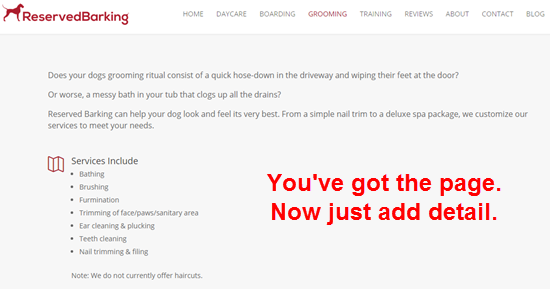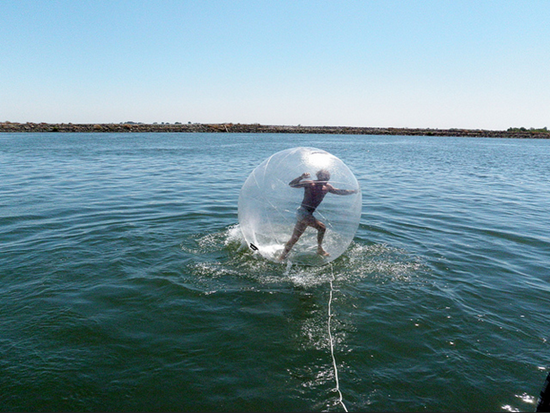You shudder at the thought of having to write content for your site or pay someone to write it until the day you sell your business or buy Depends.
Don’t get me wrong: writing and sharing your best info over a period of months or years can have enormous payoff. My post “100 Practical Ideas for Small-Business Blog Posts” and its follow-up can help you on that.
You’ll probably find a way, if that’s what it takes for better local rankings and more customers. But must creating “content” feel like a trip to nowhere?
No.
Is there another way to make progress?
Yes.
Focus on one-time content first. Build on the content you have, the knowledge you have, and the site you have.
You’ll still have to write or get someone else to, but the point is you’re focusing on the highest-payoff work.
So, before you worry about what to create and share long-term, here’s what you should do on your site to make the most of a limited tolerance or budget for writing:
Priority 1: Perform “content CPR.”
Find short, undetailed pages on your site and beef them up with all the info a potential customer might want to know. Focus on pages where you describe a specific service you offer. If possible, find pages that rank very low on page 1 or somewhere on page 2. Those pages may just need a little life breathed into them to start moving in the rankings.

Not sure what to put on those pages? My post on “25 Principles of Building Effective City Pages for Local SEO” might get the juices flowing (even if you’re not creating “city” pages).
Priority 2: Fill in the gaps.
For example, do you have a giant “Services” page with one paragraph on each service you offer? Break it up. Create a separate page for each service, and go into more detail on each of those pages. You can keep the main “Services” page if you want: just add some links to the more-specific subpages.
In general, is there a service you want to promote that doesn’t have a page you’re really proud of?
That’s low-hanging fruit, especially if it’s a less-popular search term. The benefits of getting really granular with your pages are that (1) it’s an easy way to pick up rankings for niche terms (e.g. “blower door test Atlanta”), and that (2) the people who’d type in those niche terms probably aren’t tire-kickers, know exactly what they want, and are just looking for the right person or company.
(For more suggestions on busting out more pages, this other post of mine might help: 21 Pages a “Small Local Business” Site Needs for Tip-Top Local Visibility.)
Priority 3: Cannibalize your other resources.
Do you have underperforming microsites or old websites that have some decent info in them?
Did you put a lot of time into writing a blog post that not even your mom would read?
Did posters on your Facebook page ask questions that you get asked all the time, and that should maybe go on an FAQs page?
Do you have customer reviews that would be a shame not to show off on your site? (As I’ve explained, it’s OK to do that.)
Was the “about us” section on your Yelp page a labor of love?
If you think your site would be a higher-payoff place for anything you’ve written, online or offline, bring it on home.
—
Only once you’ve taken those 3 steps as far as they’ll go should you turn to creating blog posts, videos, or whatever other content on an ongoing basis. The timing matters. At least the one-time stuff can start paying off while you’re wrestling with the ongoing content-creation. Or you can just conserve your energy.

What are your “content priorities”?
Any you’d add to the list?
Leave a comment!



